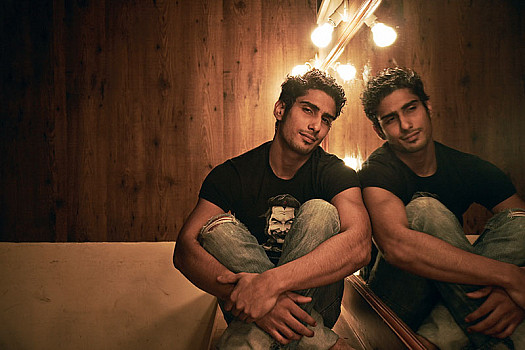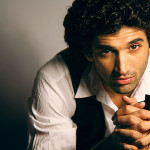Born To Act
A startling natural on screen, he made an impact with his very first movie Jaane Tu Ya Jaane Na. Prateik Babbar who has been recently noticed for his bravura performance as a washerman in the arthouse Dhobi Ghat speaks to Verve about his private dreams and professional challenges
Despite her resolute jaw, she had an unguarded softness in her fiercely dark eyes. As images of Smita Patil in Mandi flit across the television, you’re inexplicably torn between an intense desire to protect her and the knowledge that in doing so, you are ushering in the storm that she will inevitably bring into your teacup. It is this same dichotomous quality that is Smita’s primary bequest to her son, Prateik Babbar.
Even at a casual glance there can be little doubt that the 24-year-old Prateik is Smita’s son. He has his mother’s evocative eyes. Like her, he is startlingly natural on screen. His effortless debut in Jaane Tu Ya Jaane Na won him the Filmfare special jury award. They also share a rebellious streak that stems from an utter disregard of boundaries. (Smita had famously jumped into a jeep at three in the morning and driven from Mumbai to Jaipur on a lark.) Prateik wears black nail polish, has a nose piercing and hangs out with a raucous gang of friends who party up a storm in Goa. Smita created cinematic history, purely on her own steam, with no mentors or sugar daddies. Being the son of two famous actors, Prateik could have made daddy Raj Babbar launch him. Instead, he meandered into an audition for Jaane Tu… and informed his bewildered father after he got the part.
Unlike his mother’s blazingly confident screen presence, Prateik’s body language, both on and off-screen is diffident and unsure, a potential by-product of his youth and complicated upbringing. After Smita’s untimely death at 31 through pregnancy-related complications (a mere two weeks after Prateik was born), he was raised in Mumbai by his maternal grandparents. While the boy can certainly act, his hesitant body language comes through clearly in the recently-released Dhobi Ghat, where he plays a young go-getter who dreams about being the next Salman Khan.
It is in his mother’s flat in Bandra that we meet for the interview to discuss the film. The first thing that strikes you about the apartment is that it has an air of hushed secrecy. It reveals almost nothing about the household or its inhabitants.
This same sense of fierce privacy is imbued in everything about Prateik’s upbringing. In his own words, he was terribly overprotected as a child. “I had the textbook strict upbringing.” he says quietly. Prateik reacted like the average teenager with unbridled rebellion. “My grandmother was a sweetheart but I was the typical teenager, I broke all the rules and gave her hell,” he says, as he slips a Marlboro cigarette out of its box which he holds on to but doesn’t light.
It was in this phase that films beckoned. He had begun working with Prahlad Kakkar and acting in commercials. Prahlad sent him to the audition of Jaane Tu… and much to his surprise he got the part and utterly enjoyed the experience. It was possibly the first thing he ever did where he went out on a limb and succeeded at something. The validation and recognition that came with that film was definitely a new high for him.
But at this stage films hadn’t sunk in as a serious career. “I wanted to be a rock star with long hair and have women screaming for me. I toyed with so many options till Dhobi Ghat came along and changed my life,” he says.
Director Kiran Rao spotted him at the Jaane Tu… premiere and called him for a screen test. “I went because I was bored,” he says grimacing at his immaturity. When Rao told Prateik he would be playing a dhobi, he was completely taken aback. “When I first heard the title Dhobi Ghat, I didn’t know what that meant. I had to look it up. I was in the ‘are you kidding me’ space. But then the sensitivity and graph of the story blew my mind. Aamir and Kiran really made me believe in myself. Aamir taught me two speech exercises that helped with enunciation. One was to clench my teeth tightly and speak my dialogues out in the highest pitch and the second was to scream out my lines.
“It was only once the film began that I realised I was onto something big and if I didn’t get serious, I would blow it. Earlier on a scale of 10 on seriousness and focus, I would give myself one. Now it’s 1500 on 10. So, I’m terrified. I feel different, it’s a good change. I work out, do yoga to build my concentration, follow a diet, read books on acting. I had a reputation to turn around and I think I have done it successfully.”
To get into the skin of the character, Prateik had to do the unthinkable — wake up at 6 a.m, and go to the Mahalaxmi Dhobi Ghat every morning to watch dhobis at work. He would spend the entire morning and afternoon there. “I’d observe them go through the entire process — wash the clothes, then dry and deliver them. I studied the way they are, the way they live and understood their state of mind. I really wanted to be able to give Kiran what she had visualised about the character.”
When he sees the completed film, he is exhilarated. “It’s thrilling. I know I could have been better in parts of the film but I see growth in myself as an actor. I see maturity and more understanding. I also see uneasiness and unsureness but I know that will go.”
The bouquets have already started pouring in and at the Toronto Film Festival, he got a standing ovation. He can’t conceal his excitement when he talks about it, the memory of the buzz still fresh in his mind. “It was crazy. I said to myself, ‘are you kidding me, I feel like Madonna,’” he says, beaming his head off.
It was one of the moments Prateik wished his mother had been there to share. He has dedicated the film to her. “It’s the kind of cinema she did and I think she would have liked the film,” he says, his dark doe-like eyes lighting up. “I love her work. I have seen all her films. The amount of good things I hear about her, drives me to want to be like that. People always ask me about her but I didn’t know her at all. So in my head she is this imaginary thing.”
Prateik admits he watches her work over and over again. “It’s strange to see her on film. Almost like she’s talking to me…she’s saying those lines to me. I wonder what she was like. I’ve heard she was quite a bindaas babe. I wish she was around, just to know what it would be like to have a mother-son relationship. I’m told she really wanted to have a kid. Her biggest dream was to be a mother and she didn’t fulfil it,” he says, staring vacantly at the still unlit cigarette in his hand.
It is presumably this vacuum that he’s trying to fill when he says he wants audiences to love him. “Yes I cannot wait to be a big star but it is love and appreciation I crave… far more than fame or money, more than the good things in life. I’m way too passionate about being an actor now. I want people to see that passion and just love me, like they loved my mother. The amount of goodwill they have for her makes it incredible to be her son,” he says intensely. If his mother’s listening, she would feel very fulfilled.
Verve Trending
Sorry. No data so far.
us on Facebook to stay updated with the latest trends






